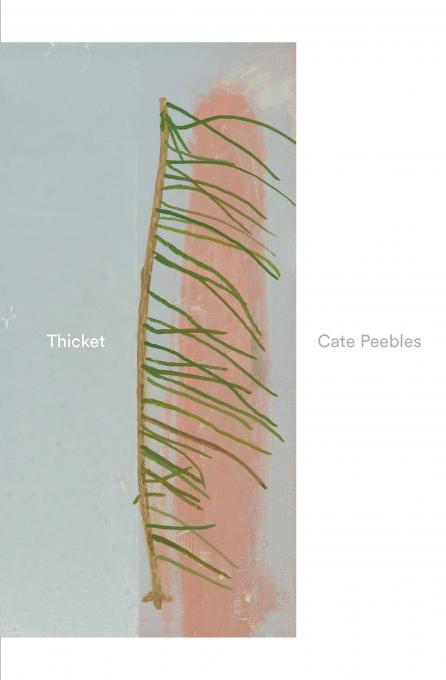
In his 1987 painting “While There Is Still Time Let’s Go Out and Feel Everything,” Paul Thek scrawls those words in looping light blue script over a darker blue punctuated by wavy lines. Because the words and the marks share an improvisational, finger-painted quality, they blend together and into the only slightly darker background. From a distance, the work looks like an abstract color-field of molted blue. Poet Cate Peebles uses the title of Thek’s painting as the epigraph to her debut collection, Thicket. It serves as a fitting introduction. Like the painting, these capacious poems are permeable, full of images of one self dissolving into another while immersing readers in a vibrant, sensual world.
Time overlaps, and the human and animal worlds merge. A couple stands “just where the starved wolves / of Paris were stoned & eviscerated for devouring / forty citizens in the winter of 1450.” Or a lonely guest crammed into the corner of a party melts inviting “an eventual cat,” which “will lap at you / from the puddle where you spilled.” While Peebles mostly uses conventional punctuation, she leaves off the final period in the majority of her poems. This creates a sense of perpetualness; each poem gestures toward or opens into the next.
The collection has an exhilarating immediacy. Much of it deals with the rush of emotions during the early stages of a new relationship. The speaker promises: “I will listen like an open wound.” With refreshing directness, Peebles writes, “I don’t know what you want / To do so badly with living / But I want to do it, too.”
While the poems' sentiments are directed outward with these declarations, form is tightly contained. This creates a compelling tension between the emotionality of the writing and the precision of the form. For example, the long poem at the center of the book “The Woodlands” is printed in a slender justified column. This forces the reader to slow down in order to navigate the syntax as rich images unspool down the slender column: “I’m all the branches sprawling underwater housing sea serpents & giant squid staring back up sending ripples over your eyes.” Often following the knotty sentences rewards the reader with moments of surprise. Peebles writes, “Something unsightly could happen here such as holding another human incredibly close &” Here, the ampersand holds out the tantalizing possibility of something else in the white space of the page.
In addition, the relationship between syntax and form creates a sense of caution as it forces the reader to carefully pick their way down the page. While at times, the speaker seems to be rushing headlong into experience, she is not without trepidation. She admits to “wishing to not want anything from anyone,” while desperately awaiting a phone call. She writes, “It’s hard to know a person & hard to be a person & harder yet to let a person see your wet eggshells.” There is something luscious about encountering these moments of candor, and Peebles strikes a difficult balance between the craftiness of her finely wrought sentences and the directness of some of her assertions.
She writes, “Finally I’m not trying to look cool or anything just dripping & wanting to unzip everything around you so it falls away succulent from the bone.” An aching tenderness emerges from this twining of difficulty and desire as people fumble for “actual grace.” This is found in the woodland a place of “infinite tender eyes.” In “The Woodlands,” Peebles evokes the landscape of Western Pennsylvania, teaming with raccoons, deer, and squirrels. She includes an alphabetical list cataloging the wildlife in that region, which consists mostly of small mammals like rodents and bats. Even though these animals are common, they are worthy of being mourned when found on the side of the road, “all the love that’s left suffocating fumes as it curls in my face.” Despite its messiness, death, and chaos, Peebles writes “with admiration / for the woodland.”
What makes this book such a compelling read is that it is difficult to pin down in terms of style or school. It is an intriguing mix of nature poetry, experimental writing, and the lyric. Peebles tries to characterize the wildlife of Western Pennsylvania while moments of everyday violence intrude with images of roadkill and the female-bodied speaker walking with her keys “used as fangs” as the warning systems “warn us not what’s coming but what’s already here.” Despite the dangers, the speaker keeps thrusting herself outward to run through the woods, fall in love, and search the sky for eagles. While she admits, “I am not painter & have zero idea where the green should go,” she resolves, “I’m painting a door for you to slam / wide open.” These poems are that door flung open to “All that’s left / . . . everything, everywhere.”
by Cate Peebles
Lost Road Publishers, 2018
$15; ISBN: 978-0-918786-65-4
75 pages
